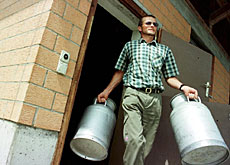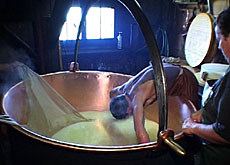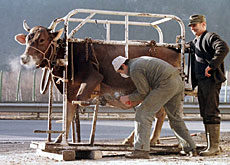Farmers fighting declining revenues

Over 1,000 farmers have been demonstrating in the town of Morges on Lake Geneva to demand more financial support in the face of falling prices.
Farmers’ incomes dropped over eight per cent in 2001, while costs rose more than seven per cent.
The protest on Friday kicked off a series of demonstrations against Swiss agricultural policy planned for the coming week.
Organised by the Swiss Farmers’ Union, it highlighted the decline in farmers’ numbers, their increasing struggle to survive, as well as falling prices and the liberalisation of the agricultural market.
“Swiss agricultural policy is being guided by free-market considerations,” said Roland Furrer, a spokesman for the Union. “Society expects a lot of farmers, so it should pay as well.”
The march came as the Swiss Federal Research Station for Agricultural Economics and Engineering revealed that farmers’ revenue had fallen despite improved productivity.
Worse off
A farmer earned on average just SFr30,356 ($20,000) in 2001, a drop of over SFr4,000 from three years earlier. Mountain farmers were even worse off, with a gross income of just SFr20,809.
Statistics show that Swiss farmers’ are alone in Europe in seeing their incomes decline. Their counterparts European Union saw their income increase by an average of three per cent last year. In Austria and Germany, it rose by up to ten per cent.
According to farming organisations, many Swiss farmers belong to the “working poor” category, and a large numbers of farms could shut down in the near future. Over 2,800 farms have closed since 1996, over 30,000 since 1990.
One problem is that many Swiss farms are simply too small to stay in business. “There are too many farmers with small properties,” said Carol Franklin, an expert on sustainable development. “In the EU, the average farm is 60 hectares, while in Switzerland it’s less than 15.”
Quotas
The current bone of contention between farmers and authorities is the government’s plans to do away with the milk quota system.
These guarantee minimum prices for farmers and give each farm the right to produce a set quantity of milk. Without them, say the farmers, they won’t survive and the result will be a glut of milk, which will push prices down further (see “Milk quotas under pressure”.)
“We think the government is rushing into a decision, without being properly informed,” Furrer told swissinfo. “We don’t know what the EU is planning to do with its own system, and no special measures are planned to help producers.”
Supply and demand are also out of sync, according to Melchior Erler, the director of the Farmers’ Union, with far too much milk being produced. He believes a liberalisation of the market would have even worse consequences.
“It would be better to encourage a drop in milk prices with direct payments to farmers, rather than let the market decide how much milk should cost,” he told Swiss radio.
Liberalisation
The protests come ahead of a parliamentary debate on agricultural policy, scheduled for the winter session. A key government objective is the liberalisation of the milk market.
Jacques Chavaz, deputy director of the Federal Agriculture Office, says farmers’ fears that opening the market will lead to a collapse in prices are unfounded.
“We are not looking at a major change in agricultural policy like in the early 1990s,” he told swissinfo. “Any changes we have implemented in recent years have been progressive and have not encountered any major opposition.”
Small changes may be enough to push many farmers out of their livelihoods, according to Carol Franklin, particularly when the effects of foreign competition are added to the mix.
“Farmers are being squeezed on all sides,” said Franklin. “Border tariffs are falling, which means that imports are being becoming cheaper.”
Divided front
Franklin also believes that the farmers may be their own worst enemies when it comes to defending themselves.
“At the moment, they’re not unified,” she told swissinfo. “Farmers cannot be reliable discussion partners for politicians and the distributors. One side says yes, while the other says no.”
Still farmers aren’t the only one concerned by changes in agricultural policy. “Consumer habits are changing,” said Franklin. “People are looking for organic food, more innovative products.
“This means that production has to be more ecological, more organic. But if we want to ask the farmers to stop doing things, we have to pay for it.”
by Scott Capper, swissinfo
Farmers are holding a series of protests across Switzerland against worsening production conditions.
Their revenue dropped over eight per cent last year, while costs increased more than seven per cent.
Over 30,000 farms have folded since 1990.
Producers fear the planned liberalisation of the milk market will lead to overproduction and a collapse of prices.
Farmers’ revenue dropped by eight per cent in 2001, despite improved productivity.
Costs increased by seven per cent.
Fewer than 74,000 farms remain in Switzerland – 30,000 have closed since 1990.
Average farm size is less than 15 hectares.
EU farming revenues increased over three per cent in 2001.

In compliance with the JTI standards
More: SWI swissinfo.ch certified by the Journalism Trust Initiative


You can find an overview of ongoing debates with our journalists here . Please join us!
If you want to start a conversation about a topic raised in this article or want to report factual errors, email us at english@swissinfo.ch.